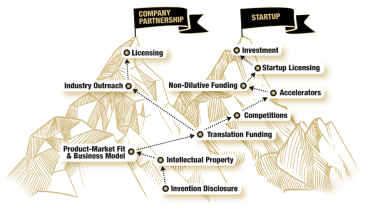NSF I-Corps at CU Boulder helps researchers solve pressing problems
Photo: The August 2025 cohort of NSF I-CorpsTM Hub West's Starting Blocks Customer Discovery Workshop at CU Boulder.
From agriculture to aerospace, the National Science Foundation's (NSF) I-CorpsTM is a launchpad at the University of Colorado Boulder, helping innovators in and out of the University of Colorado bring research and inventions to the people who need them most. By equipping scientists and inventors with entrepreneurial tools, the program transforms great ideas into startups that tackle real-world problems.
Growing up in Minnesota, Elliot Strand (Alum: CU Boulder College of Engineering and Applied Science), co-founder and CEO of PAGE Technologies, “saw firsthand how excess fertilizer runoff led to worsening algae blooms in our lakes, choking ecosystems and turning once thriving bodies of water into lifeless green pools.” The experience left a lasting impression on Strand, urging him to act. “It’s what motivated me to pursue science and ultimately to co-found PAGE Technologies to develop tools that could help prevent these issues at the source,” he said.
Strand and co-founder Payton Goodrich are driven by a commitment to revolutionize agriculture while also fighting pollution. They first collaborated on an effort to engineer cutting-edge sensor systems while Strand earned his PhD at CU Boulder and Goodrich at the University of California Berkeley. PAGE, which stands for Printed Agricultural and Environmental Technologies, “reflects both our core technology and our broader mission to improve how we monitor and manage natural resources across food, water and climate systems,” said Strand. PAGE Technologies is now pioneering the next generation in water and soil management with a platform of affordable biochemical sensors for real-time monitoring of plant nutrients.
Strand and Goodrich launched PAGE Technologies in late 2023, following the completion of National Science Foundation (NSF) Innovation Corps (I-CorpsTM) programs, which were designed specifically to help researchers and innovators identify both their target customer base and market gaps.
“I-Corps helped us identify a real problem that customers are willing to pay to solve. It taught us the fundamentals of business development, market research, and the importance of product-market fit,” said Strand. “Most importantly, we learned how to systematically engage with customers to understand their needs and build a sustainable business around that insight.”
Empowering researchers, entrepreneurs and society
Like PAGE Technologies’ founders, hundreds of students, faculty and community innovators have now benefited from I-Corps since it arrived at CU Boulder. In 2018, before joining NSF’s I-Corps initiative, the university began offering I-Corps-like programming, including the iterative customer discovery programs now offered as Starting Blocks and Research-to-Market (R2M) through Venture Partners at CU Boulder, the commercialization arm of the university that serves CU Boulder, UCCS and physical sciences investigators at CU Denver.
“Our role in the NSF I-Corps Hub West reflects our commitment to ensuring that CU Boulder’s research makes a real difference in people’s lives,” said Massimo Ruzzene, senior vice chancellor for research and innovation and dean of the institutes . “We are proud to collaborate with peer institutions and engage with Colorado communities to ensure that groundbreaking research reaches markets and people who need it most.”
Since 2021, when CU Boulder officially became a partner institution in the NSF I-Corps Hub West, it has been a national leader in the initiative. Within the hub, the campus collaborates with other top research institutions across the region, including Texas Tech University, University of Southern California; University of California, Los Angeles; California Institute of Technology; University of California (Riverside and Santa Barbara); Colorado State University; University of Utah; Colorado School of Mines; and University of New Mexico.
I-Corp’s primary purpose is to empower researchers, entrepreneurs and society by fostering a culture of innovation, supporting startup creation and delivering tangible economic and societal benefits from federally funded research. It is designed to bridge the gap between academic research and marketable innovation by equipping scientists and engineers with entrepreneurial skills, practical training and real customer interviews to move their discoveries from the laboratory to the marketplace.

But what is "commercialization?"
The path to commercialization—also known as "research translation" or "tech transfer"—can be challenging, so Venture Partners unites industry partners, entrepreneurs and investors to help researchers, inventors and creators at the University of Colorado bring their groundbreaking discoveries into the marketplace.
For the researcher with a great idea, I-Corps essentially helps fill a void in the spin-out process—backing up cool science with understanding and demonstrating the value proposition of that research and innovation, according to Emily Vogt, director of venture development at Venture Partners. “The number one goal of the NSF in funding these programs across all of our universities is to commercialize these technologies and actually find the space in the market,” said Vogt.
I-Corps regional hubs serve as the backbone of NSF’s National Innovation Network, allowing it to reach a broad pool of innovators nationwide, according to Daniel Marshall, CU Boulder’s I-Corps program manager. According to Marshall, by extending CU Boulder I-Corps into rural and underserved regions of Colorado, it retains local talent and ensures a more well-rounded national innovation pipeline.
“There’s importance and impact to working and partnering with schools that just don't have the bandwidth to do what we do at CU Boulder,” he said. Marshall highlighted the successful relationship he has forged through I-Corps programming with Colorado Mesa University, Fort Lewis College, Trinidad Community College, Western Colorado University and others. “I think that’s great for economic impact and rolling out ideas,” said Marshall. Each year, teams from CU Boulder’s I-Corps have progressed to the National I-Corps Teams Program, where they can win a $50,000 small business grant to use toward customer discovery expenses.
Mentorship is another critical part of the programs, said Vogt. “We help pair those technical teams with a business mentor that can help make introductions, broadening [a team’s] network and synthesizing all of these conversations that they’re having,” she said. “It’s an incredible opportunity for our research teams to engage with this awesome startup ecosystem in Colorado, fueled by mentors who willingly give their time to these interesting projects.”
“Remarkably useful” programming
Sally Hatcher , now co-founder and managing partner at Buff Gold Ventures, a private venture capital firm backing CU Boulder entrepreneurs, launched both Starting Blocks and R2M in her prior role with Venture Partners.
“I-Corps provides invaluable training for academics to ‘get out of the lab’ and talk to industry experts to understand concrete industrial requirements and gaps,” she said. “It’s a terrific way to learn about product-market fit and finding a solution to practical problems with paying customers. Whether participants choose to create a startup, license their technology to another company, or return to the lab, the professional training is remarkably useful for almost all participants.”
Further developed by Vogt and Susan Strong , entrepreneur-in-residence and NSF I-Corps curriculum instructor, I-Corps programming is now a popular and successful tool in helping countless researchers move their work from the theoretical to the practical.
“I-Corps is accelerating the translation of discoveries from lab to impact,” said Strong. “The idea is that all of this federal money has gone into inventing these things, and we want to get it out into society for two reasons: so that it can create jobs and have economic impact,” she said. Both Strong and Hatcher believe so keenly in the I-Corps programming that they still act as national I-Corps program instructors. “I use this framework every day to talk to founders about how to get started,” said Hatcher.
A national standout
CU Boulder stands out in the national I-Corps landscape in several ways. First, at CU Boulder, I-Corps is directly integrated with the university’s intellectual property and commercialization efforts within Venture Partners and the Research and Innovation Office, said Marshall. The Venture Partners team refers new research teams from CU Boulder and other campuses to the I-Corps regional programs, which provide a crucial look at each team’s development and potential. “This close-knit set-up is crucial,” he said. “Very few universities outside CU Boulder have adopted this kind of integrated model. It’s a major reason why we stand out nationally.”
Second, Vogt pointed out CU Boulder’s I-Corps program leads outreach to many campus groups as well as to Colorado communities and rural universities. “Our I-Corps program has been the entrepreneurial touchpoint for so many people,” she said. “It’s allowed us to bring more people into the university, understanding what role the university has in the startup ecosystem.”
Lastly, CU Boulder’s exceptional efforts in rural outreach have caught the attention of the national I-Corps leaders. “They’re now directing hubs to adopt some of the things that we’re doing, which is a really cool thing,” he said.
Remarkable teams from within the hub and beyond include CU Denver’s Moatassem Abdallah , associate professor of civil engineering (CU Denver College of Engineering, Design and Computing). After completing Starting Blocks and R2M in 2021, Abdallah co-founded Commutrics in 2023 and is now its CEO. The company spun out “to help employers and cities implement data-driven, incentive-based commuting programs,” said Abdallah. Commutrics is a transportation platform designed to connect commuters with various transportation options, incentivizing the most sustainable choices while saving them money and improving their overall health and well-being.
Abdallah credits I-Corps with “helping us validate our value proposition through direct engagement with potential customers. It sharpened our focus on market fit, clarified key pain points in commuter and employer behavior, and guided us in shaping a scalable, impact-driven business model.” Commutrics is now seeking partnerships with cities, employers and transportation agencies to expand the reach of the platform and “drive meaningful behavior change in commuting,” said Abdallah.
Another stellar team, led by Jarrod Schiffbauer , formerly special research professor (Physics) at Colorado Mesa University. Now visiting research professor (Mechanical Engineering) at CU Boulder, Schiffbauer focuses on a novel, more efficient thrust concept for in-space propulsion systems and, in particular, a way to move small satellites around in space for Earth observation, communications and scientific research. Since traditional propulsion systems don’t scale well for the SmallSat and CubeSat market, new miniaturized solutions like Schiffbauer’s are essential.
After three weeks in Starting Blocks, and ultimately in making their way through the national I-Corps program, Schiffbauer said he and his team have been able to “better understand the in-space propulsion market, where our technology might best fit in, and which shortcomings or risks we should most focus on,” he said. “I-Corps has been extremely informative and changed the way we approach finding which problems to solve.”
The future of a “pillar program”
At the end of 2026, amidst a boom in participation, CU Boulder’s five-year I-Corps grant will be up for renewal, and the university will apply to extend funding for this vital programming.
“I-Corps is really a pillar program for what Venture Partners does, and we have a really good number of inventors joining the program, even if they’re not looking to become startup CEOs,” said Vogt. “The kind of market awareness they’re bringing into their research has been really beneficial for a lot of our labs. I-Corps has helped our researchers understand their own technologies a little bit better, and it informs their future development efforts.” I-Corps programming increases the likelihood that university research leads to real-world impact, she said.
With another five-year I-Corps grant, CU Boulder would continue accelerating the translation of cutting-edge research into products, services and technologies that address societal challenges in fields such as healthcare, energy and agriculture while boosting the economy and training a skilled entrepreneurial workforce. “Our goal with I-Corps is to broaden the perspective of these research teams. They are brilliant scientists and engineers working on life-changing technologies,” said Vogt. “More often than not, the business is the vehicle that will drive the impact.”
Reflecting on his experiences with I-Corps and spinning out PAGE Technologies, Elliot Strand is excited and humbled. Recently, the company has been awarded several prominent grants, including one from the CO-WY ASCEND Engine and the U.S. Environmental Protection Agency. “We’re deeply grateful that so many people recognize the urgency of this problem and believe in our approach to solving it. With recent funding and growing partnerships, we’ve been able to build a small but mighty team,” said Strand. “Working alongside people who are equally mission-driven has been one of the most rewarding parts of this journey.”
What Can We Do Together?
The Newsroom
For marketing and communication inquiries or news tips, contact Daniel Leonard, senior marketing and communications specialist for Venture Partners at CU Boulder.
For media inquiries, please visit colorado.edu/news/formedia.





